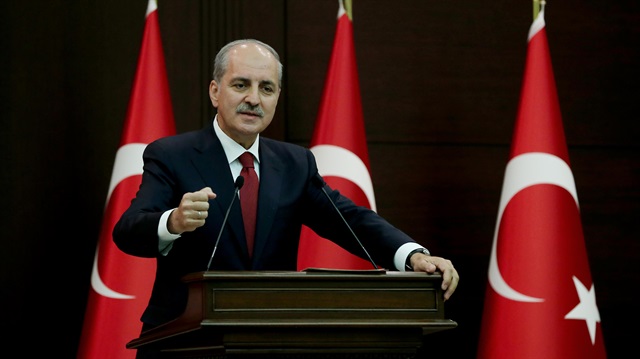
This is an important and positive development for Turkey, Numan Kurtulmuş says
Deputy Prime Minister Numan Kurtulmuş has said the terrorist YPG forces, which are the PYD/PKK's armed wing, are retreating to the east of River Euphrates and are also emptying Manbij city in northern Syria.
Speaking to the media during a break from the Council of Ministers meeting in Ankara on Monday, Kurtulmus said: "This is an important and positive development for Turkey."
Turkey has long demanded that PYD/PKK and its affiliate YPG remain to the east of Euphrates and not cross the river towards the west in Syria.
“Turkey will never let the PKK/PYD form a terrorist corridor. Now a large number of PYD forces are returning to the east of the Euphrates River, which is an important development for Turkey," the deputy prime minister said.
About the Euphrates Shield Operation, Kurtulmuş said Turkey rejects a corridor in Syria's north that would include the PYD/PKK and YPG, terrorist groups which want full domination in the area.
"We know that a corridor established in the region that includes claims of PYD and YPG means Syria will practically be separated just like Iraq," Kurtulmuş said. "Naturally, Turkey will not let that happen and [will] intervene."
Kurtulmuş also added that Turkey was "not against" the existence of Kurdish people who are residing in Syria's north. He also said Turkey remained determined to clear Syria's Raqqa province and Iraq's Mosul province from Daesh elements.
Operation Euphrates Shield began last month and saw Free Syrian Army fighters, backed by the Turkish military, take control of Jarabulus in northern Syria from Daesh.
Syrian opposition forces recently took control of the Tal-ar district in the town of Cobanbey in the northwestern Aleppo province, which had been occupied by Daesh militants.
Turkey has said the operation aims to bolster border security, supporting coalition forces and eliminating the threat posed by terror organizations, especially Daesh.
The operation is in line with the country's right to self-defense borne out of international treaties and a mandate given to Turkey's armed forces by its parliament in 2014, which was extended for another year in September 2015.
The deputy premier also highlighted counter-terrorism efforts in the country, saying that Turkey was fighting against all three terrorist groups, including the PKK, Daesh and Fetullah Terrorist Organization (FETÖ).
About the extension to state of emergency imposed in Turkey, Kurtulmus said there was nothing specific about such an extension.
"Nothing was discussed in the Council of Ministers regarding the extension of the state of emergency," Kurtulmuş said.
President Recep Tayyip Erdoğan had announced a three-month state of emergency after the July 15 coup bid.
Kurtulmuş, when asked to evaluate global credit agency Moody's decision to downgrade Turkey's rating, said the rate cut had been "politically motivated".
"Any of the credit rating agencies' move of lowering Turkey's grade is not the end of life. It is obvious that Moody's move was politically motivated," he said.
"The thing that we are facing a hard time to understand is that how come the perspective of Moody's analysts changed to the opposite way in just two days," he said.
Moody's Investor Service revised Turkey's rating Friday to "Ba1" from "Baa3" and assigned a "stable" outlook.
The global credit agency said the move "concludes the review for downgrade that was initiated on July 18," which began after a failed coup attempt.
Moody's said assigning stable outlook balances downside risks in the Turkish economy, which the agency defined as "large and flexible".
Turkey's economy continued to expand while the Turkish government still has "a strong fiscal track record", it said. "The stable outlook on the Ba1 rating reflects the strengths in the credit profile, namely the government's robust balance sheet, which would allow for the absorption of shocks and flexible responses."



